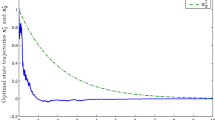Abstract
This paper investigates the Pareto optimality of the regular and the indefinite stochastic cooperative linear-quadratic difference games in a finite time horizon. We derive a general form and a linear property of the solution to the linear stochastic difference system by defining several sequences of bounded and linear operators. The performance criteria’s convexity can be guaranteed naturally under the weighted matrices’ constraints for the regular cooperative game, and the weighting technique can well characterize the Pareto optimality. We also establish a novel convexity criterion for the cost functionals of the indefinite cooperative game, in which we find that the minimization of the performance criteria’s weighted sum is equivalent to the Pareto optimal strategies. To derive all the Pareto optimal strategies and solutions, we present a computing algorithm using the weighted difference Riccati equation and the weighted difference Lyapunov equation for the regular and the indefinite cases. We present a practical example in the economy to validate the results.
Similar content being viewed by others
References
Chen S P, Li X J, Zhou X Y. Stochastic linear quadratic regulators with indefinite control weight costs. SIAM J Control Optim, 1998, 36: 1685–1702
Rami M A, Chen X, Zhou X Y. Discrete-time indefinite LQ control with state and control dependent noises. J Glob Optim, 2002, 23: 245–265
Zhang W H, Xie L H, Chen B S. Stochastic H2/H∞ Control: A Nash Game Approach. Boca Raton: CRC Press, 2017
Edgeworth F Y. Mathematical Psychics: An Essay on the Application of Mathematics to the Moral Sciences. London: Kegan Paul, 1881
Pareto V. Cours d’Économic Politique. Lausanne: Duncker & Humblot, 1896
Pareto V. Manual of Political Economy. Oxford: Oxford University Press, 1927
Engwerda J C. The regular convex cooperative linear quadratic control problem. Automatica, 2008, 44: 2453–2457
Engwerda J C. Necessary and sufficient conditions for pareto optimal solutions of cooperative differential games. SIAM J Control Optim, 2010, 48: 3859–3881
Reddy P V, Engwerda J C. Pareto optimality in infinite horizon linear quadratic differential games. Automatica, 2013, 69: 1705–1714
Reddy P V, Engwerda J C. Necessary and sufficient conditions for pareto optimality in infinite horizon cooperative differential games. IEEE Trans Automat Contr, 2014, 59: 2536–2542
Peng C C, Zhang W H. Multiobjective dynamic optimization of cooperative difference games in infinite horizon. IEEE Trans Syst Man Cybern Syst, 2021, 51: 6669–6680
Zhu H N, Zhang C K. Finite horizon linear quadratic dynamic games for discrete-time stochastic systems with N-players. Oper Res Lett, 2016, 44: 307–312
Ge Y Y, Liu X K, Li Y. Pareto optimal control of the mean-field stochastic systems by adaptive dynamic programming algorithm. ISA Trans, 2020, 102: 81–90
Chen W Y, Chen B S, Chen W T. Multiobjective beamforming power control for robust SINR target tracking and power efficiency in multicell MU-MIMO wireless system. IEEE Trans Veh Technol, 2020, 69: 6200–6214
Chen W Y, Hsieh P H, Chen B S. Multi-objective power minimization design for energy efficiency in multicell multiuser MIMO beamforming system. IEEE Trans Green Commun Netw, 2020, 40: 31–45
Engwerda J C. LQ Dynamic Optimization and Differential Games. Chichester: Wiley, 2005
Cunha N O D, Polak E. Constrained minimization under vector-valued criteria in finite dimensional spaces. J Math Anal Appl, 1967, 19: 103–124
Yu P L. Multiple-criteria Decision Making Concepts. New York: Plenum Press, 1985
Huang P Y, Wang G C, Zhang H J. A partial information linear-quadratic optimal control problem of backward stochastic differential equation with its applications. Sci China Inf Sci, 2020, 63: 192204
Elliott R, Li X, Ni Y H. Discrete time mean-field stochastic linear-quadratic optimal control problems. Automatica, 2013, 49: 3222–3233
Ni Y H, Elliott R, Li X. Discrete-time mean-field stochastic linear-quadratic optimal control problems, II: infinite horizon case. Automatica, 2015, 57: 65–77
Shi J T, Wang G C, Xiong J. Linear-quadratic stochastic Stackelberg differential game with asymmetric information. Sci China Inf Sci, 2017, 60: 092202
Tian R, Yu Z Y, Zhang R C. A closed-loop saddle point for zero-sum linear-quadratic stochastic differential games with mean-field type. Syst Control Lett, 2020, 136: 104624
Xu J J, Shi J T, Zhang H S. A leader-follower stochastic linear quadratic differential game with time delay. Sci China Inf Sci, 2018, 60: 112202
Penrose R. A generalized inverse for matrices. Math Proc Camb Phil Soc, 1955, 51: 406–413
Lin X Y, Zhang W H. A maximum principle for optimal control of discrete-time stochastic systems with multiplicative noise. IEEE Trans Automat Contr, 2015, 60: 1121–1126
Acknowledgements
This work was supported by National Natural Science Foundation of China (Grant Nos. 61973198, 61633014), the Research Fund for the Taishan Scholar Project of Shandong Province of China, and SDUST Research Fund (Grant No. 2015TDJH105).
Author information
Authors and Affiliations
Corresponding author
Rights and permissions
About this article
Cite this article
Peng, C., Zhang, W. Multicriteria optimization problems of finite horizon stochastic cooperative linear-quadratic difference games. Sci. China Inf. Sci. 65, 172203 (2022). https://doi.org/10.1007/s11432-020-3177-8
Received:
Revised:
Accepted:
Published:
DOI: https://doi.org/10.1007/s11432-020-3177-8




